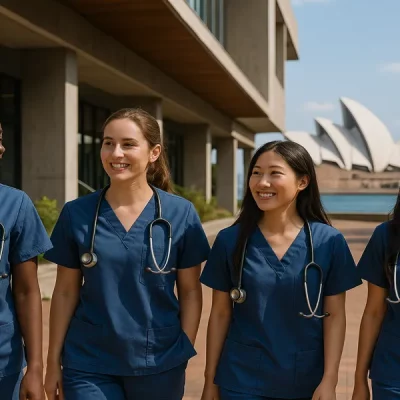Study in Melbourne for International Students 2025
Table of Contents
Melbourne, renowned as Australia’s cultural and educational capital, stands out as a top destination for international students in 2025. With its world-class universities in Melbourne, Australia, cutting-edge facilities, and innovative academic programs, it attracts thousands of learners from around the globe. The city offers a multicultural atmosphere, ensuring a warm and inclusive environment for students of all backgrounds. Beyond academics, student accommodation in Melbourne is both diverse and accessible, catering to varying budgets and preferences. Here’s a guide to why studying in Melbourne in 2025 could be the best decision for your academic and professional journey.
Why Study in Melbourne for Higher Education?
Melbourne consistently ranks as one of the top destinations globally for international students, offering an unmatched combination of quality education, cultural diversity, and career opportunities. Here are the reasons why Melbourne should be at the top of your list for higher education:
- Quality of Life: Regularly ranked as one of the most livable cities globally, Melbourne ensures a high standard of living with excellent healthcare, public transport, and safety. Its green spaces, like the Royal Botanic Gardens, provide a perfect balance to the urban lifestyle, and a thriving job market supports students during and after their studies.
- Career Opportunities: Melbourne’s robust economy provides ample part-time work opportunities, allowing international students to earn while they study. Fields like technology, healthcare, and arts also offer internships and post-graduation placements, setting a strong foundation for future careers.
- Eco-Friendly and Sustainable City: Known for its sustainability initiatives, Melbourne features extensive bike lanes, eco-friendly public transport, and renewable energy projects. Universities are also leaders in sustainability research, giving students the chance to contribute to a greener future.
- Thriving Sports Culture: Melbourne’s love for sports is unmatched, hosting iconic events like the Australian Open and games at the Melbourne Cricket Ground (MCG). These events provide students with opportunities to engage with the local community and enjoy world-class sports entertainment.
- Strong Support for International Students: Melbourne is dedicated to supporting its international students through services like orientation programs, legal aid, and free workshops offered by organizations like Study Melbourne. This ensures students feel welcome and secure, making their transition smooth and enriching.
Top Universities in Melbourne: Rankings, Courses, and Fees
Melbourne, Australia’s cultural capital, is a beacon for international students seeking world-class education, vibrant city life, and unparalleled career opportunities. Known for its prestigious universities, Melbourne consistently ranks among the top student cities globally. Below is a comprehensive comparison of Melbourne’s top universities, including their rankings, popular courses, and annual tuition fees:
| University | Global Ranking (2025) | Popular Courses | Annual Tuition Fees (AUD) |
| University of Melbourne | #13 (QS World Rankings 2025) | – Master of Business Administration (MBA) – Bachelor of Arts – Master of Engineering – Doctor of Medicine – Master of Data Science | – Undergraduate: 30,000–47,000 – Postgraduate: 35,000–55,000 – Doctoral: 35,000–45,000 |
| Monash University | #37 (QS World Rankings 2025) | – Master of Pharmacy – Bachelor of Information Technology – Master of Public Health – Bachelor of Commerce – Master of Advanced Engineering | – Undergraduate: 30,000–45,000 – Postgraduate: 35,000–50,000 |
| RMIT University | #3 globally for Art & Design | – Bachelor of Design – Master of Urban Planning – Bachelor of Communication (Media) – Master of Cybersecurity – Advanced Diploma of Engineering | – Undergraduate: 25,000–40,000 – Postgraduate: 30,000–45,000 |
| Deakin University | Top 1% globally (ARWU Rankings) #123 (QS World Rankings 2025) | – Bachelor of Nursing – Master of Education – Bachelor of Environmental Science – Master of Business Analytics – Bachelor of Sport Science | – Undergraduate: 25,000–38,000 – Postgraduate: 28,000–42,000 |
| La Trobe University | #217 (QS World Rankings 2025) | – Bachelor of Social Work – Master of Information Technology – Bachelor of Biomedical Science – Master of International Relations – Bachelor of Business | – Undergraduate: 24,000–36,000 – Postgraduate: 28,000–40,000 |
Popular Courses to Study in Melbourne
Melbourne’s diverse academic offerings ensure there’s a course for every student’s interest and career aspirations. Below is a detailed overview of some of the popular courses in Melbourne, along with relevant details on universities and career opportunities.
| Field of Study | Why Choose It? | Top Universities | Career Opportunities | Example Programs |
| Business and Management | Melbourne is a global financial hub, offering ample networking and internship opportunities. | University of Melbourne, Monash University, RMIT University | Roles in finance, marketing, entrepreneurship, human resources, and consultancy. | Master of Business Administration (MBA), Bachelor of Commerce |
| Engineering and Technology | Known for innovation and cutting-edge research facilities, Melbourne is ideal for aspiring engineers and tech enthusiasts. | Monash University, RMIT University, Swinburne University | AI development, renewable energy engineering, civil engineering, and software development. | Bachelor of Software Engineering, Master of Civil Engineering |
| Medicine and Health Sciences | Melbourne boasts world-class hospitals and research centers, ensuring excellent training and research opportunities. | University of Melbourne, Deakin University | Careers in public health, clinical research, healthcare management, and hospital administration. | Bachelor of Medicine, Master of Public Health |
| Arts and Design | Melbourne’s rich cultural scene makes it a haven for creative individuals passionate about media, design, and performance arts. | RMIT University, Victorian College of the Arts | Media production, graphic design, performing arts, and creative direction. | Bachelor of Fine Arts, Master of Design Innovation |
| Environmental Sciences | Programs focus on global sustainability challenges, with Melbourne at the forefront of green initiatives and environmental research. | Monash University, La Trobe University | Careers in environmental consultancy, sustainability policy, and natural resource management. | Bachelor of Environmental Science, Master of Sustainability |
Popular Career Choices in Melbourne
Melbourne’s robust job market and thriving industries provide a wealth of career opportunities for graduates across various fields. Here’s a deeper dive into popular career choices in Melbourne:
| Field of Study | Potential Roles | Industries/Employers |
| Business and Management | Financial Analyst, Marketing Manager, HR Consultant, Entrepreneur | Deloitte, EY, NAB, Start-ups |
| Engineering and Technology | Software Engineer, Civil Engineer, Renewable Energy Consultant, AI Specialist | Tesla, IBM, Government Infrastructure Projects |
| Medicine and Health Sciences | Public Health Officer, Clinical Researcher, Hospital Administrator | Royal Melbourne Hospital, Australian Red Cross, Biotech Firms |
| Arts and Design | Graphic Designer, Media Producer, Performing Artist | ABC Studios, Melbourne Theatre Company, Design Agencies |
| Environmental Sciences | Environmental Consultant, Sustainability Officer, Natural Resource Manager | Australian Conservation Foundation, Government Environment Departments |
Cost of Studying in Melbourne for Students
Studying in Melbourne is a dream for many, but understanding the financial implications is key. The cost of studying in Melbourne includes tuition fees, living expenses, and additional costs like travel and health insurance. The annual Tuition fees for international students studying in Melbourne vary based on the university, course type, and level of study. Here’s a breakdown of average annual tuition fees for international students:
| Program Level | Annual Tuition Fees for International Students (AUD) | Top Universities Offering Programs |
| Undergraduate Courses | 25,000 – 45,000 | University of Melbourne, Monash University, RMIT |
| Postgraduate Courses | 30,000 – 50,000 | Deakin University, La Trobe University |
| Vocational Training | 6,000 – 15,000 | Melbourne Polytechnic, Holmesglen Institute |
| PhD/Research Programs | 25,000 – 45,000 | Swinburne University, University of Melbourne |
Scholarships for International Students in Melbourne
Melbourne offers a variety of scholarships to help international students manage their education expenses. These scholarships cater to a range of criteria such as academic excellence, research potential, and financial need. Below is a detailed table listing top scholarships in Melbourne and their eligibility requirements, benefits, and application processes:
| Scholarship Name | Eligibility Criteria | Benefits | How to Apply | Application Deadline |
| Melbourne International Undergraduate Scholarship | High academic performance | Full or partial tuition fee coverage | Apply via the University of Melbourne’s official scholarship portal. | November 30, 2025 |
| Monash International Merit Scholarship | Outstanding academic records | Up to AUD 50,000 over the duration of the course | Submit an application through Monash University’s dedicated scholarships portal. | Varies by intake |
| RMIT Research Scholarship | For research-based programs | AUD 31,500 annually plus allowances | Apply during program enrollment or via RMIT’s Research Scholarship System. | Open year-round |
| Australia Awards Scholarship | Citizens from developing countries | Full tuition, living stipend, travel expenses, and health insurance | Apply through the Australia Awards official website based on your country’s eligibility. | Varies by country |
| Deakin Vice-Chancellor’s International Scholarship | Exceptional academic performance | 100% or 50% tuition fee waiver | Apply through Deakin University’s international scholarship portal. | Rolling basis |
| Swinburne International Excellence Scholarship | High academic performance and leadership potential | AUD 2,500 to AUD 5,000 annual tuition fee reduction | Apply online via Swinburne University’s scholarship portal. | Varies by program intake |
| La Trobe Academic Excellence Scholarship | Strong academic performance | Up to AUD 15,000 annual tuition fee reduction | Submit an application directly through La Trobe’s scholarship page. | Varies by intake |
Accommodations in Melbourne
Melbourne offers a wide range of accommodation options for international students, from on-campus housing to off campus student accommodations, ensuring that students find a place that suits their needs and budget. Here’s a detailed comparison between on campus and off campus accommodations in Melbourne:
| Comparison of On-Campus and Off-Campus Housing | |
| Type of Accommodation | Cost (AUD per Week) |
| On-Campus Housing | 220–350 |
| Off-Campus Housing | 150–400 |
| Features and Facilities Comparison | |
| Accommodation Type | Features |
| On-Campus Housing | Fully furnished rooms, Wi-Fi, close to libraries, lecture halls, and labs. |
| Off-Campus Housing | Private or shared living spaces, customizable setups, and often located in popular neighborhoods. |
| Cost Breakdown by Location for Off-Campus Housing | |
| Neighborhood | Proximity to Universities |
| Carlton | Near University of Melbourne |
| Brunswick | Close to RMIT and University of Melbourne |
| Docklands | Near RMIT and Victoria University |
| Advantages and Disadvantages: On-Campus vs. Off-Campus Housing | |
| Aspect | On-Campus Housing |
| Proximity | Immediate access to classes and campus facilities. |
| Cost | Fixed costs, often higher than shared apartments. |
| Community | Built-in social environment with other students. |
| Flexibility | Limited choice in room configurations or facilities. |
| Independence | Structured environment with set rules. |
Conclusion
Studying in Melbourne offers international students more than just a degree; it’s a gateway to global opportunities and personal growth. From prestigious universities in Melbourne, Australia, to a vibrant lifestyle and extensive career pathways, the city equips students with tools for success. Additionally, affordable student accommodation in Melbourne and manageable cost of living in Melbourne enhance the overall experience. Whether it’s the exceptional education system or the dynamic cultural scene, Melbourne promises a fulfilling academic journey, ensuring students are prepared for a bright future.
Frequently Asked Questions
Is it easy to get PR in Melbourne for international students?
Yes, obtaining PR in Melbourne is achievable through the Temporary Graduate visa (subclass 485), allowing international students to stay in Australia for 18 months to find work. Improving your educational qualifications can boost your points on the PR points test, increasing your chances.
How much does it cost to study in Melbourne?
The cost of studying in Melbourne varies by degree:
- Bachelor’s degree: AUD 9,000–50,000 per year.
- Master’s degree: AUD 9,000–54,000 per year.
What is the success rate of student visa applications for Australia in 2025?
The Australian student visa success rate is approximately 85.1% to 86.7% in 2025. Meeting all visa requirements significantly increases the likelihood of approval.
How much can an international student earn in Melbourne?
International students in Melbourne typically earn between AUD 15–25 per hour through part-time jobs, depending on the role, hours worked, and location.
How much bank balance is required for an Australia student visa in 2024?
From May 2024, the required bank balance for an Australian student visa is AUD 29,710. If applying with a dependent, add an additional AUD 10,394 for each spouse or partner.







